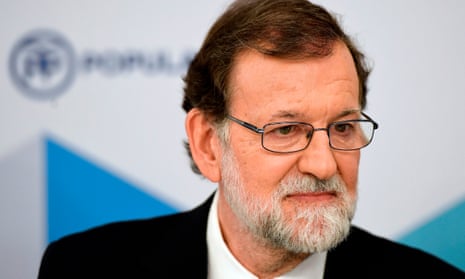Mariano Rajoy is to step down as leader of Spain’s conservative People’s party (PP) after being ousted as prime minister last week in a no-confidence vote called amid anger over corruption within the party.
Announcing his decision on Tuesday afternoon, Rajoy said: “It’s best for me and for the PP. I think it’s also best for Spain.”
Rajoy, who served as prime minister for almost seven years, said that while he could not imagine life outside the party, the time had come for him to go.
“I’ve been a grassroots member and party leader,” he said. “I’ve been a councillor and prime minister. But now it’s time to bring it to an end. The PP will carry on moving forward with its history of service to the Spanish people.”
The party’s executive committee is due to meet in the next few days to call a conference to elect his successor and begin what Rajoy termed “a new phase”. He will remain in position until his replacement is chosen.
Rajoy, 63, was often described as the great survivor of Spanish politics, but he was forced from office last Friday after parliament passed the motion of no-confidence by 180 votes to 169, with one abstention.
The motion had been proposed by the socialist PSOE party after Spain’s highest criminal court found that the PP had benefitted from a kickbacks-for-contracts scheme in a case that became emblematic of the party’s corruption. Judges in the case also questioned the credibility of Rajoy’s testimony when he was called to give evidence as a witness.
Pedro Sánchez, the PSOE leader, was sworn in as prime minister on Saturday. He has promised to address the country’s “pressing social needs” and to call a general election before the end of the current legislature in 2020.
Sánchez has also offered dialogue to try to resolve the Catalan independence crisis. On Tuesday, it was announced that Josep Borrell, a former European parliament president, would serve as Spain’s new foreign minister.
Borrell, who was born in Catalonia and was a minister in the PSOE government of Felipe González, has been an outspoken critic of Catalan independence.
In October last year, he dismissed the rhetoric being used by some in the independence movement.
“Catalonia isn’t like Lithuania, Kosovo or Algeria,” he said. “It’s not an occupied or militarised territory.”
